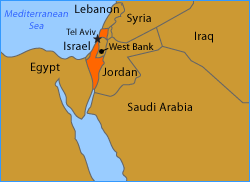For Muslim women in Israel, broad legal rights are not often matched by political clout and financial success. Approximately 20 percent of Israeli citizens are Arab, and most Arab-Israelis are Muslim. Israeli Muslims have full citizenship, and women are equal to men in the eyes of the law. Arabs hold important positions in the Israeli government, with a number of elected members of the Knesset (Parliament); in 2003 Salim Joubran became the first Arab appointed to Israel’s influential Supreme Court. Women in Israel have reached all levels of government, including prime minister (Golda Meir, 1969-1974). In the 2003 elections, nine Arabs and 18 women gained seats in the 120-seat Knesset. Yet political achievements by Jewish women and Muslim men have generally not been matched by Muslim women, who face challenges as Arabs and as women.
One challenge for Arabs relates to military service: in order to avoid the possibility of Arab-Israelis fighting against other Arabs, Israel exempts Arabs (except for Druze) from mandatory military service. Most Arabs do not serve, and miss out on the veterans’ benefits and security clearance — and, often, networking opportunities — that can help Israelis obtain good jobs. In many Arab communities, women are not expected to work outside the home and many must leave school in order to help their families. Religious and cultural traditions have also limited women’s (and girls’) rights in marriage, so the government has taken steps to give Muslim women more rights at home. Israel recently passed laws banning polygamy and child marriage — a significant development in a system that often defers to Muslim (or Jewish or Christian, depending on the situation) religious law in family matters.
In 1999, Hussniya Jabara became the first Muslim — and Arab — woman elected to the Knesset, on the secular left-wing Meretz ticket. The same year marked the first time an Arab-Israeli won the Miss Israel contest. Whether a beauty pageant should be associated with long-term progress for women is a matter of opinion, but the honor undoubtedly raised the profile of Israeli Muslim women, at home and abroad.



